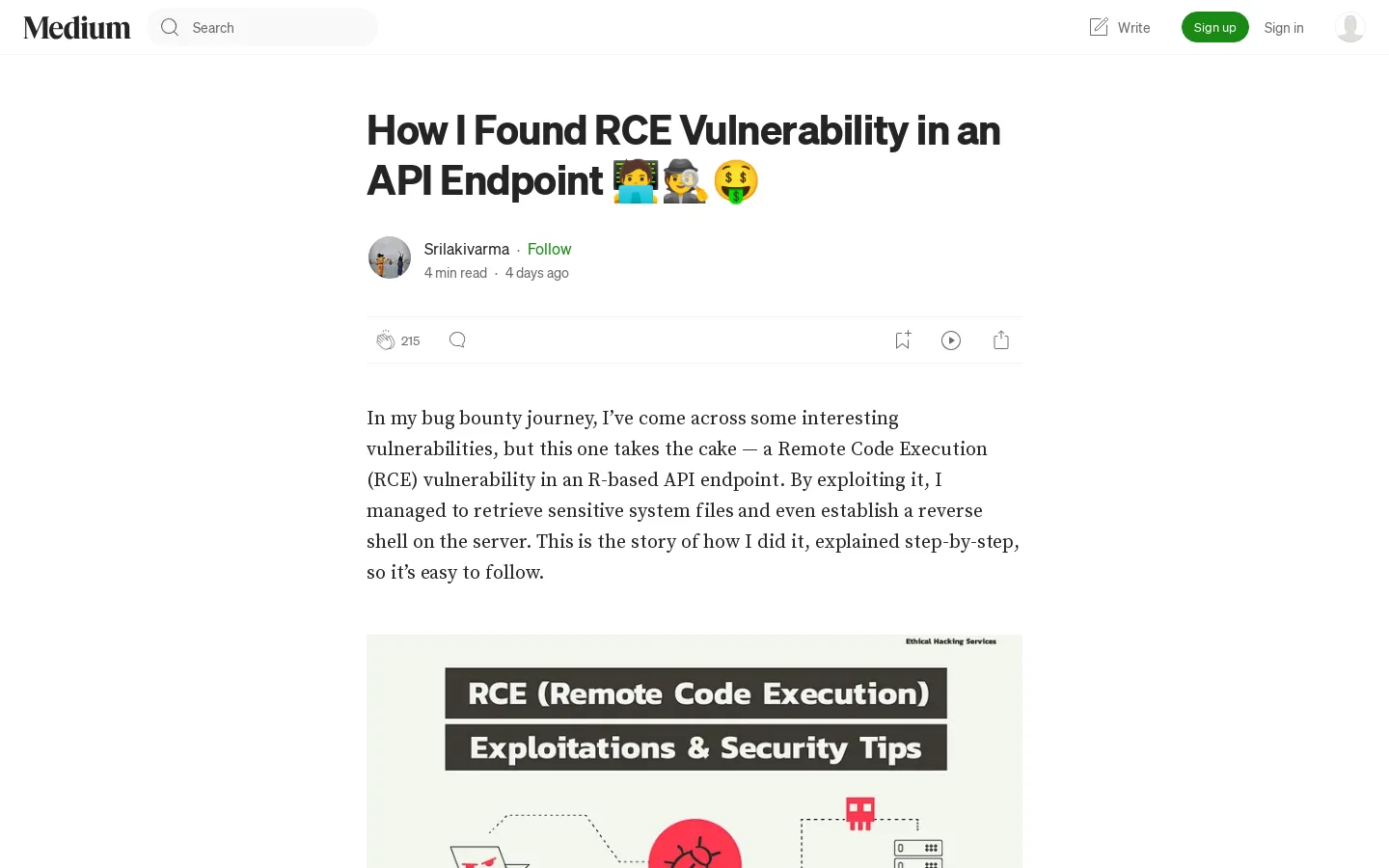
Critical RCE Vulnerability Found in R-based API Endpoint
/ 4 min read
Quick take - Researchers have identified a critical Remote Code Execution (RCE) vulnerability in an R-based API endpoint that allows for the execution of arbitrary code without input validation, posing significant security risks and highlighting the need for improved security measures in API development.
Fast Facts
- Researchers discovered a critical Remote Code Execution (RCE) vulnerability in an R-based API endpoint, allowing execution of dynamic R code without input validation.
- The vulnerability was demonstrated by crafting a malicious payload using R’s
system()function to access sensitive files, specifically/etc/passwd, confirming unauthorized file access. - A Python script was developed to send POST requests to the vulnerable API, successfully establishing a reverse shell and granting remote control of the server.
- The findings highlight the urgent need for rigorous security measures, including input validation and thorough testing, in API development to prevent exploitation.
- Tools like OpenCPU, Python, and R were essential in identifying and exploiting the vulnerability, emphasizing the importance of securing APIs that utilize powerful programming languages.
Critical RCE Vulnerability Discovered in R-based API Endpoint
In a significant cybersecurity revelation, researchers participating in a bug bounty program have uncovered a critical Remote Code Execution (RCE) vulnerability within an R-based API endpoint. This discovery highlights substantial risks, as the vulnerability could be exploited by malicious actors to execute arbitrary code on affected servers.
Unveiling the Vulnerability
The investigation identified a specific API endpoint that allows dynamic execution of R code without any input validation. This lack of validation provides a pathway for attackers to run unauthorized commands, posing serious security threats. To demonstrate the severity, researchers crafted a malicious payload using R’s system() function. This payload was designed to test unauthorized file access by attempting to read sensitive system files, such as /etc/passwd, which contains critical user account information on Unix-like systems.
Exploitation and Testing
Further exploration involved developing a Python script to send a POST request to the vulnerable API endpoint with the crafted payload. The successful execution of this script allowed researchers to retrieve the contents of the /etc/passwd file, confirming unauthorized access. This exploitation underscores the potential for data breaches and emphasizes the need for robust security measures in API development.
Implications and Recommendations
The implications of this vulnerability are profound, exposing sensitive data and highlighting the necessity for rigorous security protocols. Organizations utilizing similar R-based APIs must prioritize input validation and implement comprehensive security measures to mitigate RCE risks. This discovery serves as a critical reminder of ongoing cybersecurity challenges and the importance of proactive vulnerability assessments in safeguarding digital infrastructures.
Best Practices for API Security
To enhance API security and prevent similar vulnerabilities, developers should adhere to several best practices:
- Understand API Functionality: Familiarize yourself with the API’s intended use to identify potential weaknesses.
- Input Validation: Ensure all inputs are properly sanitized and validated to prevent unauthorized commands or data manipulation.
- Craft Specific Payloads: Create tailored payloads that exploit specific functions available in the API for thorough assessment.
- Test for Unauthorized Access: Use common files like
/etc/passwdto check if the API can execute shell commands and access sensitive data.
By following these strategies, testers can improve the overall security posture of APIs, ensuring potential vulnerabilities are identified and mitigated effectively.
Common Mistakes in API Utilization
Awareness of common pitfalls is crucial for maintaining secure APIs:
- Lack of Input Validation: Failing to validate or restrict executable code can lead to severe vulnerabilities.
- Neglecting Unauthorized Access Testing: Regular audits and penetration testing are essential to identify weaknesses before exploitation.
- Using Hardcoded Values: Avoid relying on fixed values in payloads or scripts, as they limit flexibility and increase detection risk.
- Ignoring Security Best Practices: Implement adequate authentication and authorization protocols to protect against attacks.
By avoiding these mistakes, users can better safeguard their systems against exploitation.
Tools and Resources
Several tools played a crucial role in identifying and exploiting this vulnerability:
- OpenCPU: The server hosting the R-based API endpoint where the vulnerability was discovered.
- Python: Used to write scripts that interact with the vulnerable API, facilitating exploitation.
- R: The programming language utilized in the API endpoint; its functions were exploited to execute arbitrary commands.
These tools underscore the technical landscape surrounding the vulnerability and highlight the need for robust security measures when deploying APIs interfacing with powerful languages like R.
Original Source: Read the Full Article Here



